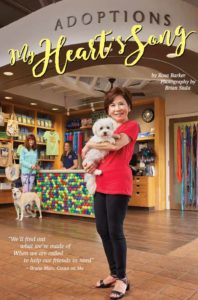
The compassion at the heart of Ginny Tiu’s advocacy for those who have no voice is a great source of joy in her life. Her God-given talent as a piano prodigy at age 5 gave her the opportunity to travel the world, where she witnessed heartbreaking poverty and harsh inequities, calling her caring nature to action during a lifetime of humanitarian and animal welfare efforts.
Ginny speaks ardently about the poverty she saw during her travels, particularly in Asia. “When you’re a child of 4 or 5 years old, you just think this is the way it is,” Ginny reflects. “Some people live this way; some people live that way. But when I grew older, seeing the disparity bothered me so much.”
Along with the support she gives to Ronald Mc-Donald House and the YWCA, Ginny’s empathy is also expressed through her presence on several nonprofit boards. She presently serves on the board of the Hawai‘i Symphony Orchestra (HSO), the University of Hawai‘i Foundation (UHF) Board of Trustees and the Animal Legal Defense Fund (ALDF), a national animal advocacy and protection organization. “I believe in and am committed to the mission and work of these organizations,” says Ginny.
Striking a Chord
“I support our symphony because music has made such an impact in my own life,” says Ginny. “I know the joy it brings, and its power to bring people together, something that is so needed, especially now. We have a world-class symphony
that we should be very proud of and support.”
She is also very enthusiastic about the Hawaii Youth Symphony (HYS). “They do a fantastic job!,” she says. “I’m always so inspired when I see and hear them.” Ginny feels that music has such a positive effect on young people. “When you’re young, you’re so impressionable. You’ve got a vacuum and if you don’t fill it with positive things, it will be filled with the wrong things.”
Ginny’s commitment to the mission of the UH Foundation is based on her belief that education has a greater importance beyond what it can do for an individual. Even more importantly, she feels education gives that person the tools to help them reach their full potential so that “they can in turn contribute to society, in whatever is their passion.” Unsurprisingly, Ginny is not impressed by talent alone or by a person’s wealth. She believes those are gifts from God. “It’s what they give back that tells me about them, and either impresses or depresses me.”
In 2014, Maryknoll School recognized Ginny’s spirit of giving back with the Monsignor Charles A. Kekumano Noblesse Oblige Service Award, which recognizes those who devote their time and talent to the service of others. She was a reluctant honoree when she was first asked, feeling that she was only doing what “I can’t not do,” but agreed to accept it as a way to bring the causes she supports to the public’s attention. In 2017, Ginny was named Outstanding Philanthropist of the Year by the Association of Fundraising Professionals and the following year was a YWCA O‘ahu Leader Luncheon honoree.
But all the laurels in the world pale into insignificance when compared to the joy Ginny derives from actively pursuing her personal mission. “I have to believe in the mission — the cause — and then I’m in 110 percent. The greater good is what I’m looking for. I support and want to be an advocate for the most vulnerable — our ku¯ puna, keiki and our animals.”
A Symphony of Support for the Voiceless
Ginny also serves on the board of the Hawaiian Humane Society (HHS). Its mission is to promote the human-animal bond and the humane treatment of all animals. She feels blessed to be in a position where she can be a “voice for the voiceless,” especially animals. She lights up when she talks about them, and about the mission and work of the HHS. Her passionate advocacy on their behalf during the organization’s 2012 capital campaign to expand and improve the current Mō‘ili‘ili campus helped raise $18 million. They recently raised $7 million of their $10 million target to complete their new West O‘ahu campus.
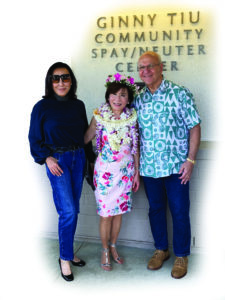
The HHS takes in about 50 animals every day, no matter what condition they’re in. They give them the medical and behavioral care they need, before putting them up for adoption. They found homes for more than 6,000 animals last year. Ginny has twice been the organization’s board chair. She testifies before the legislature at committee hearings about animal cruelty laws, believing that all animals deserve to be treated humanely, not only pets.
“If they suffer, I suffer,” she says. “It should bother us. Mahatma Gandhi wisely said that the greatness of a nation and its moral progress can be judged by how it treats its animals. That’s why I am totally committed to doing everything I can with my time and financial resources, to be their advocate. It bothers me whenever I hear someone say, ‘It’s just an animal,’ as if they have no value. I believe that person is either ignorant, heartless, or both, and is not someone I can relate to.”
One day, when she was visiting the HHS, their rescue team brought in 184 dogs and Ginny saw with awful clarity the scope of the problem and the great need for fostering. Rescue dogs are sometimes in a traumatized state from being badly mistreated. That vulnerability makes them unsuitable for adoption straight away, so foster families — who are trained in the kind of special care that’s needed — step in to help rehabilitate them. Foster pets might also be simply underweight and in need of daily medical care, which the foster parent is also trained to give.
Having spent much of her life living in hotel rooms, Ginny felt right at home with condo living, but it came with a limit of only two small pets. So, when she saw the great need and made the commitment to caring for more than the two dogs she already had, she moved to a house with a big backyard. Ginny now has 10 rescue dogs and fosters others, especially senior dogs and those with special medical needs. She jokes that “I’m an old soul — when I was born, I was already 20 years old. Now I’ve got my dogs and I behave like a kid!” As with music, having a pet brings happiness into a person’s life. “When people are either humming a tune or hugging a pet, they’re smiling,” Ginny adds.
Community Concertmaster
Ginny was instrumental in the establishing of the Ginny Tiu Community Spay/Neuter Center at the present Mō‘ili‘ili campus. She didn’t hesitate when discussion came up about the need for a spay/neuter center to serve the community,
and she made a pledge to ensure that it would be built. She knows it is one of the most effective ways to humanely control
animal overpopulation.

Low-cost spay/neuter services have been offered at the Hawaiian Humane Society’s Mō‘ili‘ili campus since 2018. The facility celebrated its 10,000th surgery last year. In February this year, it was renamed the Ginny Tiu Community Spay/Neuter Center in honor of her commitment to O‘ahu’s animals in need and her many generous contributions to the organization.
The center participates in the City and County of Honolulu’s Neuter Now program, as part of its efforts to increase the availability of affordable cat and dog spay/neuter services. Pre-surgery exam, surgery anesthesia, sterilization surgery and removal of stitches (if needed) at affordable prices are provided at the center. Call 808-356-2255 or visit https://hawaiianhumane.org/spay-neuterowned-pets to make an appointment.
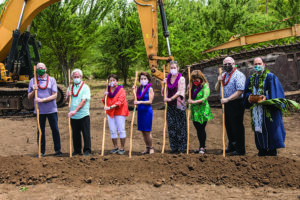
The City and County of Honolulu also has a Feline Fix program. It waives all sterilization and microchipping fees for free-roaming cats (https://hawaiianhumane.org/free-roaming-cats). Spay/neuter procedures for free-roaming cats include anesthesia, surgery, microchip, ear notch, FVRCP vaccine and post-operative pain medication. Appointments for these services at the Spay/Neuter Center should be made through https://hawaiianhumane.org/spay-neuter-frc.
Sterilizing free-roaming cats and returning them to the colonies where they make their home is a humane and effective way to reduce this population over time. The Hawaiian Humane Society supports the use of a community-based Trap-Neuter-Return-Manage (TNRM) strategy. They provide traps for rent to transport the cats to and from the clinic. Some helpful tips on humanely deterring cats roaming your property are available at https://hawaiianhumane.org/humane-deterrents.
A New Verse
Ginny is co-chair of the Capital Campaign Committee raising funds to build a second campus for the HHS to serve the needs of West, North and Central O‘ahu. Construction on the 5-acre Old Fort Weaver Road site in Ewa began in February and is on target to open in early 2023. The property is a generous 2015 gift from D.R. Horton.
Surveys and studies conducted since 2011 have revealed that about 63 percent of residents in the area have pets and about 50 percent of the services provided at HHS’s Mo¯‘ili‘ili campus are used by residents from that area. One of the main goals of the new facility is to provide a new generation of shelter care by optimizing the HHS’s response to the needs of the animals and the people who visit them — seven days a week.
Plans include a sheltered, open-air space for adoption services, six adoption pavilions and acquaintance areas for potential adopters. A 1-acre off-leash dog park will serve the needs of the shelter pets housed at the center while waiting for adoption or to be reunited with their owners. When the park it is not being used by the center, it will be open to the public and their pets.
The main building will include an Animal Admissions Center, an Animal Fostering Office and a classroom for educational programs, orientation for volunteers, and community events that fit the HHS’s vision of “People for animals. Animals for people.” A variety of veterinary services will also be available. For more information, go to https://hawaiianhumane.org/capital-campaign.
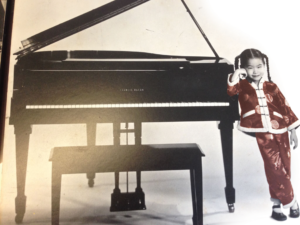 How a Lifelong Love Song Began
How a Lifelong Love Song Began
Ginny was hailed as “the Chinese Shirley Temple” and as a child prodigy pianist. By the time she was 5, she had been on Ed Sullivan, Perry Como and all the major TV shows. Ginny and her mom and dad initially came to the US so she could appear on a radio show in March, 1959. They were still in the states at Christmas. Ginny remembers her mom being miserable: “She wouldn’t let my dad play any Christmas songs and would cry because her other six children were absent. Then my dad realized we weren’t going to go home again. The following March, he asked my grandmother and my aunty to bring the other six children to this country.”
In 1962, at the age of 8, she performed for President John F. Kennedy. Ginny and her sister Vicky were seen by moviegoers everywhere in the very popular Elvis Presley movie “Girls! Girls! Girls!” Colonel Tom Parker’s invitation to perform in another movie with Elvis conflicted with Ginny’s full schedule, so her sister, Vicky, played the part of Sue-Lin in “It Happened at the World’s Fair,” another big hit.
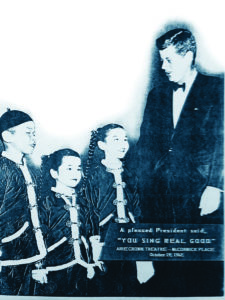 That same year, Whitman Publishing released a Ginny Tiu paper doll book with cut-outs of her favorite costumes. There was even a 15-inch porcelain celebrity doll of Ginny in a costume she wore in “Girls! Girls! Girls!” and a 12-inch porcelain doll of her in a costume she wore when doing worldwide live performances with her two younger sisters, Vicky and Liz, and an older brother, Al. She also performed at Carnegie Hall.
That same year, Whitman Publishing released a Ginny Tiu paper doll book with cut-outs of her favorite costumes. There was even a 15-inch porcelain celebrity doll of Ginny in a costume she wore in “Girls! Girls! Girls!” and a 12-inch porcelain doll of her in a costume she wore when doing worldwide live performances with her two younger sisters, Vicky and Liz, and an older brother, Al. She also performed at Carnegie Hall.
“Out of eight siblings, three joined me on stage — my sisters Vicky [Cayetano], Liz [Morisada] and brother Al Tiu. We became best friends. We traveled the world together performing, with our dad, William, as the business manager and mom, Pat, taking care of all our personal needs.” Siblings who weren’t in “The Ginny Tiu Show” were cared for by Grandma and other family members.
Because her show was called “The Ginny Tiu Show,” she took it very seriously. “I was strict. At 6, 7 years old! Vicky was 5, Liz was 4 and I was telling them ‘No! There’s no time to play. We have to practice.’ I was very disciplined. They were more afraid of me than of our parents. And my parents were strict!”
“To this day, I am very close to my siblings. We do Zoom calls and text each other regularly,” Ginny says.
With commitment and tenacity belying her age, Ginny practiced piano four hours a day, even though she longed to go outside and play after the first hour.
As impressive as this is, when Ginny looks back on those early days, it isn’t the celebrity status that she speaks of most fondly. Instead, she talks about her family and how they inspired in her a lifelong commitment to compassionate causes.
Family Harmony
Ginny’s grandmother and grandfather and their young family moved from China at a time when there was much starvation and hardship there. They immigrated to the Philippines in search of a better life. Grandma Tiu, who was born in the era of bound feet and young picture brides, raised 10 children with her husband. When he died in his 50s, the youngest child was just 2 years old. She was left to raise her family alone and, although it was a daunting prospect, her quiet strength and strong faith provided a secure and loving environment that enabled all the children to be successful in their life ventures.
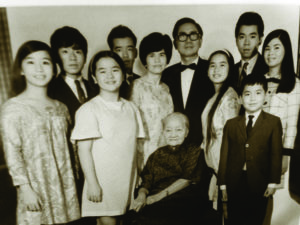
Grandma and Aunty Dionesia stayed with the six other children in 1959, when 5-year-old Ginny and her mom and dad came to the US. Ginny’s initial appearances on radio and television led to more offers. When Ginny’s father realized he had to bring the other children to join them, Grandma came with them, and Ginny’s family and other relatives cared for her in her old age. It is within this caring environment that Ginny developed her compassion for those who have none of the support and opportunities that a secure family life can give them.
Her large, extended family is a source of great joy for Ginny. Her father was one of 10 children, her mother one of seven and Ginny herself is the middle child in a family of nine. She jokes that it makes her a “balanced person” having four siblings on either side of her. “We are a very close family — something that I treasure and never take for granted,” Ginny says.
Ginny is especially close to her sister, Vicky Cayetano, an entrepreneur, businesswoman, and former First Lady of Hawai‘i, as the wife of former Gov. Ben Cayetano. Vicky is now a candidate for governor herself.
Ginny says that Vicky shares both her father’s business acumen and his caring heart. She started United Laundry Services 34 years ago with a staff of 25. Vicky and the team she put in place grew the company — which services the hospitality sector and all O‘ahu’s hospitals except for Tripler — to a staff of 1,200 throughout the state, pre-pandemic. They process 500,000 pieces of laundry a day, for over 100 customers. Because of the pandemic, Vicky had to lay off
about 75 percent of her staff, which was heartbreaking for someone with her compassion, Ginny says.
In February, Vicky packed up her office so that she can devote full time to her gubernatorial campaign. “She has never been one to sit on the side and complain, but is very solution-oriented. I totally support Vicky, not because she’s my sister, but because I know what she’s capable of doing. You can trust Vicky to always do the right thing, even when no one is watching. She’s so rare. Truly inspirational.”
Vicky moved to Hawai‘i in 1982 with her first husband and started a family. Ginny and her parents would visit from San Francisco, where they were living at the time and where Ginny was performing and volunteering for Meals on Wheels. A few years later, her parents moved to Hawai‘i to live and in 1987, Ginny moved here as well for a one-year engagement to perform at the newly renovated Hilton Village. She never left.
Because Vicky was busy with her business and Ginny was free in the afternoons, she would often pick up her sister’s children from school. One time, her niece’s school friend saw Ginny arrive and said, “Your mommy’s here.” “No, that’s my Aunty Mommy,” her niece, Marissa, replied. Ginny speaks with much fondness and great joy about how much the children and grandchildren of her eight siblings mean to her. They call her Aunty Boo. “The reason for that is that ‘queboo,’ in our dialect, means godmother. And I was godmother to almost all my nieces and nephews. They didn’t know how to say ‘que boo’ at two or three years old so they’d just call me ‘Boo.’ To this day. They’re 40, 50 years old and they call me ‘Aunty Boo,’ and now their children call me that as well. I love it because they say it with so much love, and they know how much I love them.”
The Tug at Her Heartstrings
When a reporter asked her what she wanted to be when she grew up, Ginny replied that she wanted to be a missionary nurse — much to the surprise of her father, who wondered where that had come from.
But he needed to look no further than himself for the answer to that question. “Dad had the mind, the heart and the commitment to help others,” Ginny says, and shares that her mother was also “very gracious and caring, someone who had a lot of empathy for others.” They brought their children up in the Christian faith and impressed upon them that whatever talent they had was a gift from God, and that it was meant to be shared with humility with anyone of any faith and station in life.
William quietly shared the resources that his talent for business management brought him. At his celebration of life service in 2005, relatives flew in from all over the world, not only to pay their respects, but to share their stories about all that he did for them and their families — things that even his wife and children were surprised to learn for the first time.
“He did things quietly; with no expectations” says Ginny. “The joy of being able to help was reward in itself.”
The Final Note
Ginny’s dad had a stroke in his late 70s. Because he felt that Ginny knew him better than anyone, he asked her to be his caregiver. Her mom and other family members were involved as well, of course, but for three years until his passing at age 82, Ginny willingly took on the role of primary caregiver.
“He was my biggest fan,” she says. “He was a strong man, a decision-maker who made things happen. And then to see him in a wheelchair, unable to do anything for himself — it broke my heart. I would wonder, ‘What must he be feeling?’ When I told him how bad I felt that there wasn’t anything I could do to change his situation, he reassured me, saying ‘I’ve never been more at peace. When I was younger, I was busy providing for our family. Now I have more time to spend with God and I have so much joy and peace, so please don’t be sad for me.’”
When he said to Ginny, “I’m sorry. I’m a burden. I don’t want to be a burden,” she had a heartfelt reply. “Dad, when you had to take care of me all those years, did you think I was a burden?” Ginny always made it clear to him, saying, “Please, Dad, it’s an honor and a privilege to be able to give back a little bit for all that you’ve given to me. I’m the person I am because of you and Mom. You not only provided for me and my siblings, more importantly, you gave me my values. That’s why now I have so much joy, because I understand the joy of giving back.” Ginny was also the primary caregiver for their mother, whom she also adores and misses every day.
A Chorus of Compassion
Despite the legacy of wonderful memories people all over the world have of Ginny Tiu, the performer, her greatest wish is “to be remembered as a champion for animals, someone who cares deeply for those who are truly vulnerable and for doing as much as I can to make things better for as many as I can. I feel strongly about the need to give back and to use what we have been blessed with to help others.”
Join the Chorus
“If we believe in the mission and work of an organization, we can’t just applaud them — we have to support them if we want them to be able to continue,” says Ginny.

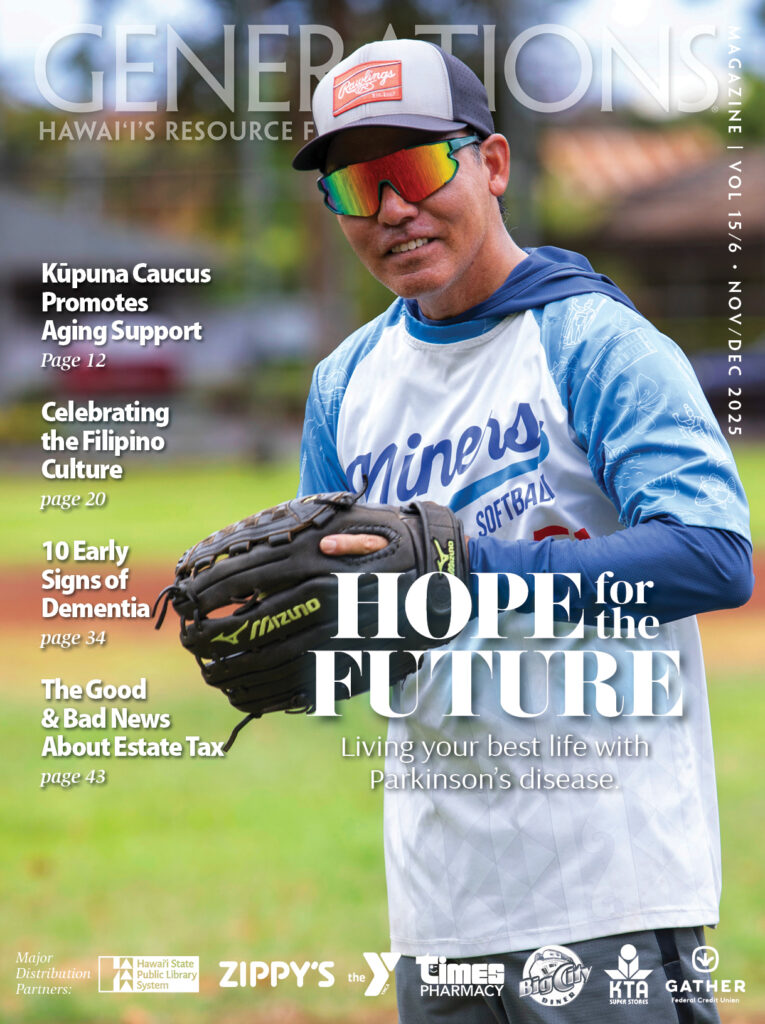
Leave a Reply